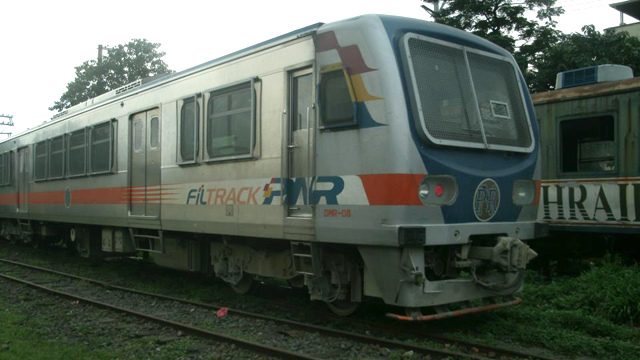SUMMARY
This is AI generated summarization, which may have errors. For context, always refer to the full article.

MANILA, Philippines – After hearing the explanations of Philippine National Railways (PNR) officials, Senator JV Ejercito on Tuesday, March 3, said the state-run train line’s proposal to raise fares was “justified.”
This comes on the same day that Ejercito and other lawmakers and party list groups filed a petition asking the Supreme Court to stop the fare hike of the Light Rail Transit (LRT) and Metro Rail Transit (MRT).
Ejercito said that compared to the budget and subsidy received by the LRT and MRT from the national government, the PNR was receiving much less.
He also echoed the explanation of PNR officials that it has been 20 years since the train line raised fares.
“20 years, tapos kung ikumpara sa LRT at MRT, napakababa ng subsidy. Tingin ko justified naman sa PNR,” Ejercito said. (It’s been 20 years, and compared to the LRT and MRT, the PNR has been getting a smaller subsidy. So I think [the PNR proposal] is justified.)
For 2015, the MRT has been allocated a total of P3.776 billion – P2.569 billion from the General Appropriations Act (GAA) 2015 and a supplemental budget amounting to P1.207 billion.
Multibillion budget
Meanwhile, the PNR has been allocated P2.3 billion for its rehabilitation projects – the first time the train line has received a billion-peso budget, according to PNR officials.
In an interview after the hearing of the Senate subcommittee on transportation, Ejercito noted that when the MRT raised fares last January, it did so after it had already been given the higher subsidy it requested from the Senate.
“In the last budget hearing, they [MRT] requested for higher subsidy, and it was given to them. But it was not mentioned that they would raise rates. In our view, the increase they asked was enough already,” Ejercito said.
“But PNR, it’s the first time they’ll get a budget this big, so let us give PNR the chance first to fix and modernize. With a very small budget, how can they improve? Hopefully, with the increase in budget, we’re expecting them to also improve their services,” he added.
The PNR seeks to increase the minimum fare to P15 from P10. This means that the maximum fare for a 56-kilometer trip from Tutuban in Manila to Calamba, Laguna will be P60 instead of P40.
Meanwhile, the maximum fare on the MRT and LRT now costs between P28-30 from the previous P15-20.
Business or service?
During the Senate hearing, PNR assistant general manager Diosdado Silva explained that despite the P2.3-billion budget, the train line still loses money from its operations.
Silva said that the amount is allocated only for the rehabilitation and repair of the train’s tracks and stations, and not for the PNR’s daily operational expenses.
The revenues from the proposed fare hike would cover this cash deficit, he added.
But Sammy Malunes, representative of commuter group Riles Network, said officials should not treat the PNR as a profit-oriented business.
He also cited common commuter concerns, such as the lack of proper platforms and an efficient ticketing system, as reasons why the PNR should focus first on managing its systems before asking commuters to shoulder additional expenses.
“Parang sinasabi ninyo na negosyo ang turing ninyo sa railway. Ang railway, service-oriented siya. Paano kaming mga taxpayer? Lugi din kami kasi wala rin kaming serbisyo,” he said. (You are treating the railway as a business instead of for public service. How about us taxpayers? We are on the losing end too if we do not get good services.)
Malunes added, “Ayusin ninyo muna ang system ninyo para di kayo mapagbintangan na magnanakaw.” (Fix your systems first so you won’t be accused of being thieves.)
User-pays policy
But PNR consultant Antonio Soriano said that passengers should also pay for their share under the user-pays principle – the idea that consumers pay for the services they use. “Otherwise, ang mga taxpayer naman sa Mindanao ang magrereklamo, sasabihin nila na sina-subsidize ng taxes namin ang ginagastos ng gobyerno sa PNR [na hindi nila nagagamit],” he added.
Silva said that the PNR originally asked for a P11-billion budget for 2015, but received only P374 million from the budget department. This amount was eventually adjusted to P546 million.
The Department of Transportation and Communication (DOTC) gave PNR an additional P1.75 billion, putting the total 2015 budget to P2.3 billion.
“Kaya kami bleeding, P2.3 billion sa projects lang. Para itakbo ang tren, we lose so much. (We’re bleeding because we have P2.3 billion but for projects only. To operate the train, we lose so much),” Soriano said.
He added, “If we come to the budget department and ask for money without showing them that we also have to make passengers defray part of the cost, we will be castigated for not doing our share under the user-pays policy.”
Following the hearing, Ejercito said he hopes to have the PNR modernization bill, which he is now in the process of drafting, passed before the 16th Congress ends.
He added that the Philippines stands to benefit from a modernized railway system: from reducing traffic congestion, to spreading out development in other cities, to lowering the cost of living.
“If you look at almost all developing countries, all of them have an efficient, modern, reliable railway system…This should be the backbone of our economy,” he said. – Rappler.com
Add a comment
How does this make you feel?
There are no comments yet. Add your comment to start the conversation.